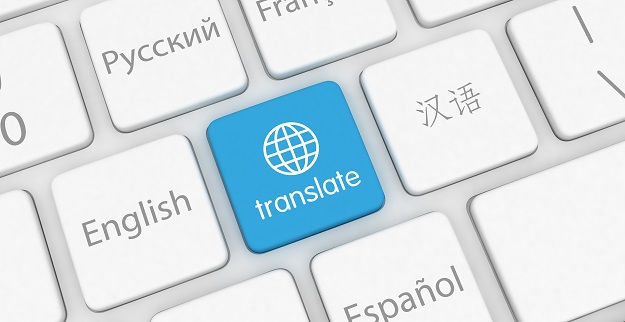As more companies expand their footprint into the global market, we see a rapid increase in the translation industry. Companies looking to globalize need the services of translation companies to ensure their message will not be lost in translation. However, the mere translation of documents and content does not suffice anymore, there is a need to take an extra step and localise your content. English is the universal business language, other languages like French, German, Italian and Spanish too are important for business purposes. Localisation services offer a complete solution to help you better adapt your content to the native market.

Translate languages online button
Translation vs. Localisation
The simple way of understanding the stiff difference between translation and localisation services is through companies who might use a website to communicate with the local audience.
· Website Translation: This is the process of changing the original language version of the web with substitute words in another language.
· Website localisation: This is the form of adapting web content and application into the regional flavour. In a broader sense, it is to modify the source language and other elements into the regional flavour.
In addition, localising offers these added benefits:
1. Increase Your Market Share
Your product is currently available to your customers in your home ground. You developed a solution that fits the cultural, linguistic, and style requirements of your market. However, does it meet the standards of a global audience? Pre-localisation, most likely not. By localising into just one other language, you open your product to a new and potentially bigger market. It is about accessibility – if a customer cannot understand how your product or service helps them, how will they ever be convinced to part with their money?
2. Competitive Advantage
Sorry to burst your bubble, but you are not the only person offering your product in the market. On top of that, if you only offer your product in English, then you might as well say goodbye to any future revenue. You always want to stay milestones ahead of your competition, and one way is by localising your product.
3. Increase in Revenue
If just 25.3% of the global population is using the internet in English, think of all those customers you are potentially missing! Even by offering your content in one other language besides English, you can potentially open a door for a new million customers. All those extra customers and market share are bound to lead to a sizeable increase in your company’s revenue.
4. Build Customer Support
In a survey conducted by the EU, 9 out of 10 internet users said they would choose to use a website in their own language if it is available. What does this tell us? Customers want your product! However, it is more beneficial to them when offered in their native language. This results in a win-win situation for both parties, your business seems more approachable in the global market and your consumer gets access to an exclusive product.
5. Mitigate Cultural Sensitivity
Some brands tend to skip the localisation process and simply translate; this can prove as the biggest flaw as they expand into a new market. Customers appreciate companies who take the time to pay attention to the small details. This can be as simple as changing the colors of the graphic content or even just the formatting of the date. It is this step of adapting the best-fit solution for your target audience to help make an impact in the global market.
Does My Business Even Require Localisation?
Chances are if your company deals with international clients or have various global settings, investing in translation and localisation services from a well-reputed company can open new windows of opportunities for you. Sectors that have had previous success with translation and localisation include:
· Banking and Finance – this sector plays a vital role in the global trading environment. In order to attain new customers in foreign countries and achieve a high level of consistency, banking, and financial industry use language translation services to make their communications clear and effective.
· Manufacturing – a significant proportion of manufacturing companies still make use of outsourcing to other manufacturers overseas. Consequently, translation is needed to help these two parties communicate clearly and effectively
· Healthcare and Medical – Medical translation services continue to be an important link in spreading the understanding of medical terminology on a global level. With the industry, rapidly excelling in multiple fields it presents stakeholders with many challenges as well. They often have various legal prerequisites to comply with among other requirements. This can simply not be obtainable without the help of expert translators, as they can ensure the maximum global outreach for people who may only be able to comprehend a single language
· Marketing – Marketing material requires a customized approach. Unlike other technical documents, your marketing material is strategically designed to let your target audience get to know you, like you, and trust you. Therefore, your brand needs to reflect this in the localised version.
· Education and Training – the translation of your educational documents is a multi-layered process. As this entails having to translate anything from eLearning material to interactive learning software translation, and curriculum guidelines to even the main textbook itself. In some cases, there are requests for translating the actual language course as well, or a request of the student to have an audio transcript of the course rather than paper books.
· Legal – while translating most documents can be as simple as transcribing word by word in legal translation this is not the case. In legal translation instead of the literal meaning, you need to transcribe the documents in legal terms in the language of the target audience. As each language carries different tones, i.e. some languages are presented in passive voices and while others are active, ensuring the message is conveyed clearly and concisely without changing the original meaning.
· Retail, Consumer, and Ecommerce – The first step in securing your global online presence is to translate and localise your website to accommodate your target market.
A study from the Common Sense Advisory in 2014 revealed that 75% of people prefer to buy products in their native language and 60% would rarely or never buy products from English only websites.
Why TW Languages?
For nearly two decades, we have provided “business to business” language service for our clients. At TW Languages, your leading translation service provider in the United Kingdom, we propose a one-stop-shop for all your translation and localisation services.
At TW Languages, we have certain unique attributes that other translation companies cannot offer, such as:
· In-House Native Translators – Unlike many translation companies, we hire all native-speaking translators. We are constantly setting new standards for our new hire translators by setting minimum requirement guidelines, such as, carrying a degree in the study of linguistics and having a five-plus year experience in professional translating, we ensure we congregate a world-class team. Catering to more than 250 languages allows us to give our clients a truly personal experience of the audience they are looking to acquire, as our translators understand the cultural and political aspects of a certain region.
· Subject-Matter Experts – We at TW Languages go the extra mile and hire experts from the field itself. For your localisation services, we would ensure an expert who has a vast number of years of experience in the field handles your project. This guarantees that there is no room for error as they will be familiar with all the special terminology required for the matter.
· Fast Turn-Around Time – No matter the size of your project, we allow promise clients a speedy delivery. Upon client requests, we have even handled projects over the period of one night.
To embark on a global success journey, contact our specialised sales team today.




